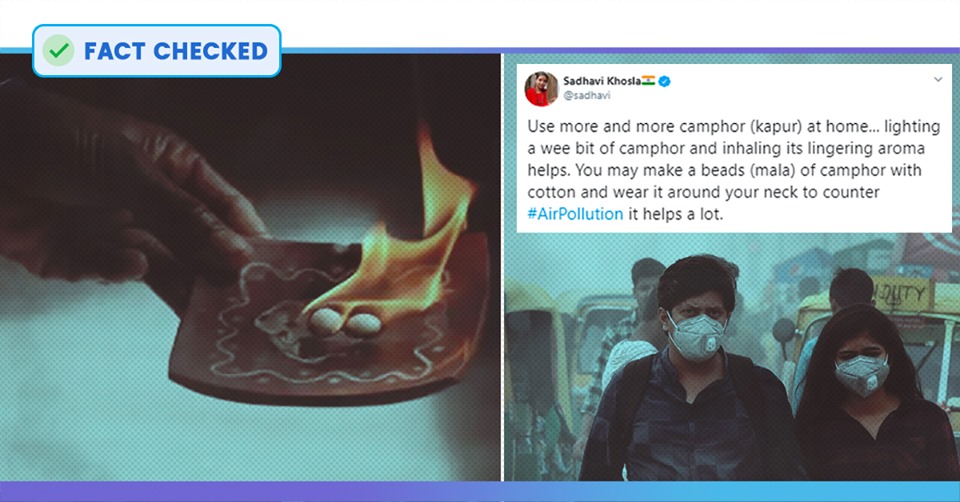Pollution levels during this winter in Delhi after Diwali has led to a lot of chaos in the National Capital, followed by implementations of stricter pollution rules in Punjab, Haryana and NCR and introduction of Odd-Even rule in Delhi as well as bickering amongst political parties and governments. Not just Delhi, entire North India is currently suffering from bad air pollution. Social media is filled with advice on how to counter air pollution and there are a few instances where misinformation is being circulated.
On November 3 2019, a twitter user Sadhavi Khosla, whose bio says she is an activist and a writer based out of Gurgaon, Haryana, tweeted about using something unusual to counter air pollution in Delhi, i.e., lighting camphor. She has around 84,000 followers on Twitter.
Use more and more camphor (kapur) at home… lighting a wee bit of camphor and inhaling its lingering aroma helps. You may make a beads (mala) of camphor with cotton and wear it around your neck to counter #AirPollution it helps a lot.
— Sadhavi Khosla���� (@sadhavi) November 3, 2019
There were also a few people who supported her views:
This is one of the best advise I have read about Delhi pollution on an individual level, this is something my dadi has been telling me to do for years ��
— Dextro (@Dextrocardiac1) November 3, 2019
thats what i was saying since yesterday but was mocked..
— Amar.N.SHARMA (@ANZAMAR) November 3, 2019
Very effective… Have been doing this for sometime
— Rakesh Jamwal (@rakeshrjamwal) November 3, 2019
The Logical Indian tried to know whether there is any truth in the claim made by Sadhavi Khosla. We found out that the actual truth is contrary to the claim of camphor helping a person in a polluted environment.
What is Camphor?
Camphor (Kapoor) is usually formed after distilling the bark and wood of the Camphor tree found mainly found in Japan, Vietnam and Indonesia, but it is also manufactured chemically. The chemical formula of camphor is C10H16O, which is flammable in nature. The substance is used in manufacturing products such as naphthalene balls, and balms amongst other products. It is mainly popular in India due to its usage in many religious functions. However, in India, the camphor that is sold is usually synthetic which is produced from pine and turpentine resin. Synthetic camphor is three times cheaper than the natural one.
Doctor/Expert’s Take on Benefits/Harms of Camphor:
“Scientists have said that burning camphor produces carbon dioxide and thereby reducing oxygen. We all know that excess carbon dioxide is not good for individuals as well as environment,” told Vishvaja Sambadh, an Environmental Health Researcher from Chennai.
Dr. Rashna Dass Hazarika, Director of Paediatrics at Health City hospital in Guwahati, on being asked on the effects of camphor, says that camphor fumes can have negative effects on children. “If you are in a closed room or you are lighting camphor, there is no way for that to go out and there is no air circulation. Inside a closed space, the effects will be much more, and it will cause harmful effects. Moreover, prolonged exposure to these fumes can result in a high risk of cancer and lung problems apart from eye and skin irritation and seizures in children.” On being asked about the harms to pregnant women, She said that the chemical composition, cyclic monoterpene ketone increases the risk of genetic defects in an unborn baby if its mother is exposed to a large amount of camphor.
Dr. Meeta Saxena, an anaesthetist based out of Aligarh, Uttar Pradesh says, “It is definitely not a good decision to light camphor inside a room, and inhaling excessive camphor fumes can lead to dizziness. There are no benefits from the practice in my knowledge.”
Dr. Amit Gawande, a pulmonologist with Apollo Clinic in Mumbai, also said, “Camphor is acclaimed to clean micro-bacteria and dust particles in the air, and also has some medicinal properties which help in clearing nasal blockages. However, practically, its properties would not help in countering the kind of pollution in Delhi. Also, the effect of its properties has not been determined.”
Conclusion:
Back in 2016, The Hindu Religious and Charitable Endowments (HR&CE) Department of Tamil Nadu asked for a systematic ban on burning of camphor (exempting natural camphor) in temples, especially in sanctum Sanctorum, for performing ‘aarti.’ The reason cited was that the substance is a chemical product and a pollutant.
In conclusion, artificial camphor which we often use is a pollutant and doesn’t help in reducing air pollution.
Also Read: Greenpeace India’s Report Reveals Air Pollution Kills The 12 Lakh People In India Annually











